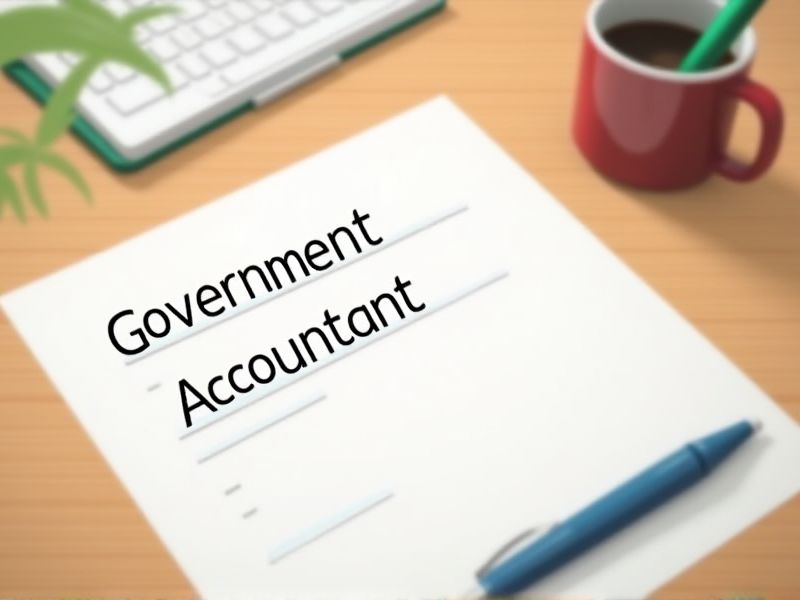
Government accounting involves managing public funds and ensuring compliance with financial regulations, making precision and accuracy crucial. Certifications serve as validation of a government accountant's skills, knowledge, and ethical standards. They enhance credibility and increase opportunities for career advancement and job security within governmental agencies. Below are some essential certifications you may need as a Government Accountant.
Certified Government Financial Manager (CGFM)
Certified Government Financial Manager (CGFM) designation is needed for a government accountant because it validates expertise in governmental accounting and financial management, ensuring adherence to recognized standards. This accreditation enhances credibility, making clients and stakeholders more likely to trust and rely on the accountant's judgment. By having a CGFM, a governmental accountant has access to ongoing professional development, keeping them abreast of regulatory changes and emerging trends. Achieving this certification can improve career advancement opportunities, as employers often favor candidates who demonstrate a commitment to their profession.
Certified Public Accountant (CPA)
A CPA designation brings a higher level of expertise and credibility, which is essential for government accountants who must adhere to stringent regulatory standards. In governmental finance, complex financial transactions require precise accounting knowledge, often necessitated by CPAs. CPAs possess strong analytical skills, aiding in effective financial planning and management of public funds. As CPAs maintain their credentials through continuous education, they stay updated on the latest practices and laws, benefiting governmental financial accountability.
Certified Internal Auditor (CIA)
Government accountants face the risk of mismanagement of public funds, and a Certified Internal Auditor (CIA) provides assurance that these funds are managed with integrity. A CIA holds the expertise to improve internal control processes and reduce the risk of fraud within government institutions. The role of a CIA includes evaluating the efficiency of government financial systems, facilitating better resource allocation. Governments benefit from CIA-led audits by achieving compliance with regulatory and policy mandates, thereby earning public trust.
Certified Fraud Examiner (CFE)
Government accountants face complex financial systems prone to fraud, making a Certified Fraud Examiner (CFE) essential for identifying and mitigating these risks. Specialized skills in fraud detection and prevention enable CFEs to uncover misappropriations and enforce accountability. CFEs bring analytical expertise and legal knowledge to ensure compliance with financial regulations. Implementing CFEs enhances the integrity and transparency of governmental financial operations.
Certified Management Accountant (CMA)
Government accounting often involves the management of extensive budgets and complex financial structures, which a Certified Management Accountant (CMA) is well-equipped to handle due to their advanced expertise in financial planning and analysis. The CMA credential emphasizes strategic management and performance metrics, valuable skills for optimizing government resource allocation. A CMA's proficiency in cost management can lead to more efficient government operations by identifying cost-saving opportunities and financial inefficiencies. Compliance with established financial regulations and ethical standards is crucial for government accountability, and CMAs are trained extensively in these areas.
Certified Information Systems Auditor (CISA)
A Government Accountant with a CISA certification can better protect sensitive financial data from cyber threats, reducing the risk of data breaches. The certification equips them with the skills to ensure compliance with stringent governmental regulations and standards, enhancing accountability and transparency. It helps in identifying and mitigating potential risks in government financial systems, thereby safeguarding public funds. With a CISA, the accountant contributes to improved IT governance practices, aligning technology infrastructure with governmental fiscal policies.
Certified Government Audit Professional (CGAP)
Government accountants face complex regulatory and financial environments, so obtaining a Certified Government Audit Professional (CGAP) certification provides them with specialized knowledge in public-sector auditing standards and practices. The CGAP credential offers a comprehensive understanding of government frameworks, enabling accountants to effectively assess and improve fiscal responsibility. By enhancing an accountant's expertise, the CGAP certification also supports transparency and accountability in governmental financial reporting. This certification helps ensure that government operations comply with regulations and efficiently manage public resources.
Project Management Professional (PMP)
Government accountants often handle complex projects involving public funds. The Project Management Professional (PMP) certification provides a structured approach to managing these projects efficiently. By implementing PMP methodologies, government accountants can ensure better compliance with regulations and optimize resource allocation. Enhanced project management skills can lead to improved accountability and transparency in financial reporting.
Certified Risk Management Assurance (CRMA)
Certified Risk Management Assurance (CRMA) equips government accountants with specialized skills to assess and manage risks. By obtaining CRMA, accountants can enhance their ability to ensure compliance with governmental regulations. CRMA certification often leads to improved decision-making processes within government entities. Having CRMA-certified professionals can increase public trust in financial management and reporting.
Chartered Institute of Public Finance and Accountancy (CIPFA)
Government accountants face complex financial regulations and public sector-specific challenges, necessitating specialized guidance. The Chartered Institute of Public Finance and Accountancy (CIPFA) provides a framework designed to enhance financial management in public services. CIPFA equips accountants with skills in governance, risk management, and financial reporting tailored to public sector needs. Access to CIPFA's resources and network ensures accountants stay informed on best practices and policy changes.
Summary
As a Government Accountant obtaining certifications, you can expect enhanced technical skills and credibility in financial management. This often results in increased job opportunities and potential for career advancement within governmental agencies. Employers may also notice improved organizational efficiency and adherence to regulatory standards. Overall, clients and stakeholders tend to place greater trust in certified accountants, leading to strengthened professional relationships.
